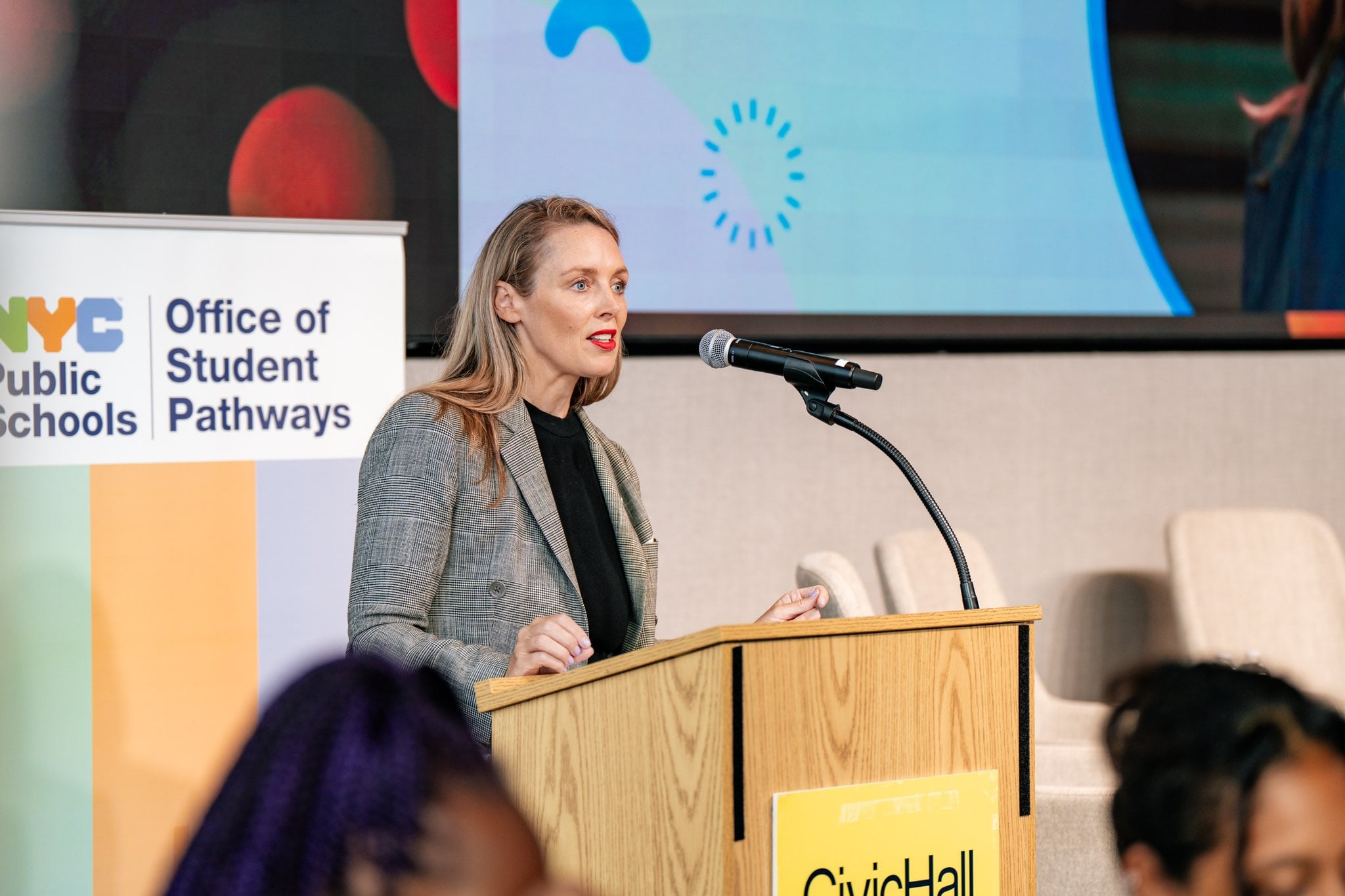Sign up for Chalkbeat New York’s free daily newsletter to keep up with NYC’s public schools.
A top Education Department official overseeing Chancellor David Banks’ signature effort to expand career education is stepping down.
Jade Grieve, who was the department’s chief of student pathways and spearheaded one of Banks’ biggest initiatives, is leaving that role at the end of September, according to a letter to department staff.
“Jade’s decision comes after her family received an incredible international opportunity, and after nearly three years of dedicated service, Jade will transition into a strategic advisory role for the coming year,” Banks wrote. Officials did not elaborate further on her departure.
With Grieve’s exit on the eve of a new school year, the leaders of Banks’ top two initiatives have stepped aside. Carolyne Quintana, a deputy chancellor who helped oversee the department’s sweeping literacy curriculum overhaul, left last school year as Banks dissolved the division of teaching and learning, which she helmed. Other senior positions, including the department’s chief of staff and deputy chancellor for early childhood, have seen leadership turnover and reshuffling in recent months.
Widely respected inside the Education Department, Grieve was the public face of Banks’ efforts to connect more high school students to career opportunities before they left the system — a shift in strategy from the previous administration’s focus on “college access for all.” She helped launch a paid apprenticeship program that offers intensive work experiences to hundreds of students at companies including Bloomberg and Amazon.
Through a new effort called FutureReadyNYC, she was involved in rolling out career tracks in education, technology, business, and health care at about 100 high schools, including paid work experiences and opportunities for early college credit.
Many of those initiatives hinge on strong relationships with the private sector, and Grieve had connections to draw on, as she previously worked at Bloomberg Philanthropies and at America Achieves where she was involved with “education-to-employment efforts,” according to her LinkedIn profile. Her work at the Education Department helped secure $100 million “in additional public and private investments,” Banks wrote, adding that she also helped improve the college advising process and open the first new dedicated career and technical high school in over a decade.
Those successes impressed some observers.
“It’s a hugely challenging area trying to partner with the private sector unprepared to mentor high school students so the effort has not seen large-scale success,” said David Bloomfield, a professor of education, law, and public policy at Brooklyn College and the CUNY Graduate Center. “But her steady hand and prior experience working on this issue at Bloomberg Philanthropies had a positive impact.”
Others echoed that sentiment. “She has been an extraordinary leader in the field of career-connected learning,” said David Adams, the CEO of Urban Assembly, a network of 22 schools across the city that has embraced FutureReadyNYC. “It’s sad to lose such a talented person.”
Grieve’s departure sparked some concern about losing a leader who built connections with outside businesses that have recently partnered with the department, including Google and Northwell Health.
Melanie Mac, who served as a senior executive director in the office of student pathways, will take over on an interim basis. Officials did not offer a timeline for naming a permanent replacement.
One senior official said they are concerned that maintaining those relationships and continuing the expansion of apprenticeships and other career opportunities could be complicated by a leadership transition. “It’s not a thing that can run on autopilot,” said the official, who spoke on condition of anonymity because they were not authorized to speak to the press. “My concern would be nobody’s filling that seat or there’s an interim, and that interim is solely internal. You’re just asking that person to do double duty,” referring to the leadership position and their original job.
An Education Department employee who worked under Grieve and spoke on condition of anonymity because they were not authorized to speak publicly said they were not concerned about disruptions related to her departure.
Grieve “was able to bring people in to start the engine, but the engine is running now and it’s running well,” said the employee.
Michael Elsen-Rooney contributed.
Alex Zimmerman is a reporter for Chalkbeat New York, covering NYC public schools. Contact Alex at azimmerman@chalkbeat.org.






